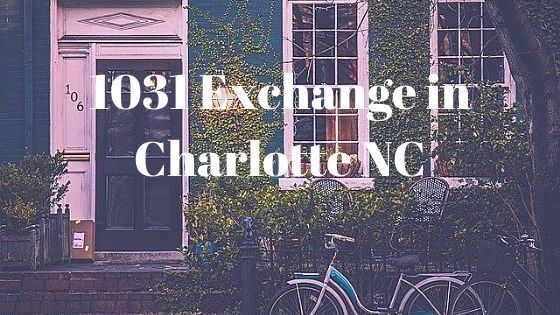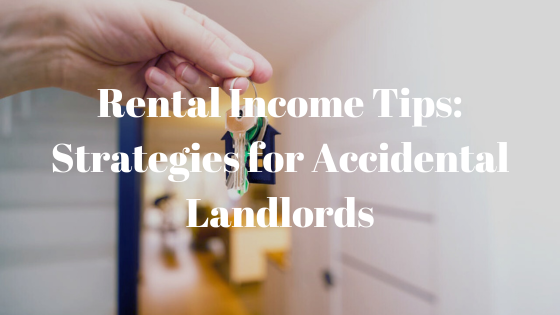1031 Exchange in Charlotte NC
A 1031 Exchange provides investors with a temporary way in which they can defer payment of capital gains on the sale of a business or investment property. Normally, the sale of an investment property attracts state and federal taxes amounting to at least 15%.
The term 1031 Exchange takes its name from Section 1031 of the Internal Revenue Code. It allows an investor to swap one property for another similar property if the investor follows the rules meticulously.
Theoretically, an investor may be able to defer payment of capital gains on investment property an infinite number of times. And this may mean that you may be able to avoid paying taxes on them altogether.
To a savvy property investor in the Charlotte area, a 1031 Exchange is a smart strategy to create wealth. In fact, a 1031 Exchange is considered in real estate circles as one of the most powerful tools available for wealth creation. Many real estate gurus and financial wizards can attribute their success to this wealth-building tool.
So let's take a closer look at exactly how they work.
What Properties Qualify for a 1031 Exchange?
Only property held for investment or for business purposes can qualify for a 1031 Exchange. Your personal residence, for example, won’t qualify for a 1031 Exchange. Also, a fix and flip property will also not qualify, because it’s solely held for resale.
What about a second or a vacation home? These will also not qualify if they are not held for rental purposes. Other properties that may not qualify for a 1031 Exchange include:
- Stocks, bonds, notes, and beneficial interests in a partnership.
- Land that’s under development for resale.
For a property to qualify for an exchange, the transaction must not be a sale of a property with the subsequent purchase of another. Rather, it should take the form of an exchange.
What’s more, both properties must be held for investment, business or for productive purposes. Properties that meet these requirements are what are referred in property law as “like-kind.”
Below are a few examples of properties that may qualify for an exchange under the Internal Revenue Code.
- An industrial building in exchange for raw land.
- Raw land in exchange for a shopping center.
- A shopping center in exchange for an office.
- An office building in exchange for a farm.
- An industrial building in exchange for an apartment building.
Deadlines for Purchasing
Before 1984, all exchanges were virtually performed simultaneously. The closing of the replacement property and the transfer of the relinquished property were done on the same day.
Besides problems arising when searching for a replacement property, investors encountered issues during the transfer of titles as well.
But after the amendments to the law were made, the transactions were smoothened to include a time cost.
- 45 Day Rule: This is the first timing restriction. An investor has up to 45 days to close on or identify in writing a potential replacement property once they have closed on and transferred their original property. The 45 days includes both weekends and holidays. If the investor is unable to meet this restriction, the IRS may choose to disqualify the process, and taxes on capital gains will ensue.
- 180 Day Rule: This relates to the closing. You must close on any of the three properties you identified within 180 days after selling the old property.
Please note that the two timelines run concurrently. For instance, if you designate a replacement property, say, 40 days later, you’ll have only 140 days left to close on it.
Types of 1031 Exchanges
Three types of 1031 exchanges exist: a delayed 1031 exchange, a reverse exchange, and a build-to-suit 1031 Exchange.
1. Delayed 1031 Exchange
This is the most common type of a 1031 Exchange. Before 1984, exchanges had to occur simultaneously, with the escrows for relinquished property being sold and at the same time the purchase of the replacement property was completed. This often resulted in problems and difficulties.
All this changed after the Section 1031 of the Internal Revenue Code was amended in 1984. And this brought about a “delayed exchange”. This allowed the exchange to be done over a 180-day period.
A Delayed 1031 Exchange is a 3-prong process. One, you need to close on the sale of the relinquished property with the help of a Qualified Intermediary (QI). Next, you’ll need to identify up to the 3 replacement properties.
This you must do with a 45 day period after selling the relinquished property. And three, the closing on the property purchased must be done 180 days after the relinquished one was sold.
2. Reverse 1031 Exchange
This is the opposite of the Delayed 1031 Exchange. In a reverse exchange, the first thing you’ll do is acquire the replacement property before selling the relinquished property. With that being said, you cannot take possession of the replacement property until the entire exchange process is finalized.
An Exchange Accommodation Titleholder (EAT) holds the new property until the sale of the relinquished property is completed.
The timelines for a Reverse 1031 Exchange are the same as those of Delayed Exchanges.
You must identify the relinquished property within 45 days of buying the replacement property. Then, the relinquished property must be sold 180 days after the purchase of the replacement property.
3. Build-to-Suit 1031 Exchange
This type if exchange is primarily designed for growing businesses that need more (or highly customized) space in order to expand. Just like in other exchange types, build-to-suit 1031 Exchanges must follow the same 180 day time frame.
Furthermore, all of the improvements and constructions must be completed within the 180-day window. What this basically means is that all remaining work—like installing the HVAC system or flooring—must be done prior to the closing.
There you have it. Everything you need to know about 1031 Exchanges in Charlotte, North Carolina. If you are just starting out, hiring a professional may be in your best interest.
Dawson Property Management can help! We have accumulated 15 years’ worth of expertise in the local real estate and rental market space!











